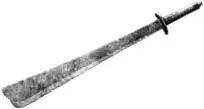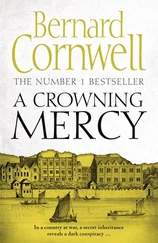‘I do not!’ the old man protested.
The priest sat on the bed and leaned close to the count. ‘Where is la Malice ?’ he asked.
‘I don’t know.’
‘You are very close to God’s judgement, old man,’ the priest said, ‘so do not lie to me.’
‘In the name of God,’ the count said, ‘I do not know.’ And that was true. He had known where la Malice was hidden, and, fearing that the English would discover her, he had sent his friend, Fra Ferdinand, to retrieve the relic and the count assumed the friar had done that, and if Fra Ferdinand had succeeded then the count did not know where la Malice was. So he had not lied, but nor had he told the priest the whole truth, because some secrets should be carried to the grave.
The priest stared at the count for a long time, then reached out his left hand to take the jesses of the hawk. The bird, still hooded, stepped cautiously onto the priest’s wrist. He lifted it down to the bed and coaxed the bird to stand on the dying man’s chest, then gently undid the hood’s laces and lifted the leather from the bird’s head. ‘This calade ,’ he said, ‘is different. It does not betray whether you will live or die, but whether you will die in a state of grace and go to heaven.’
‘I pray I shall,’ the dying man said.
‘Look at the bird,’ the priest commanded.
The Count of Mouthoumet looked up at the hawk. He had heard of such birds, calades , which could foretell a man’s death or life. If the bird looked directly into a sick person’s eyes then that person would recover, but if not, they would die. ‘A bird that knows eternity?’ the count asked.
‘Look at him,’ the priest said, ‘and tell me, do you know where la Malice is hidden?’
‘No,’ the old man whispered.
The hawk seemed to be gazing at the wall. It shuffled on the old man’s breast, its talons gripping the threadbare blanket. No one spoke. The bird was very still, but then, suddenly, it darted its head down and the count screamed.
‘Quiet,’ the priest snarled.
The hawk had sliced its hooked beak into the dying man’s left eye, pulping it, leaving a trail of bloodied jelly on his unshaven cheek. The count was whimpering. The hawk’s beak made a clattering noise as the priest moved the bird back down the bed.
‘The calade tells me you lied,’ the priest said, ‘and now, if you wish to keep your right eye, you will tell me the truth. Where is la Malice ?’
‘I don’t know,’ the old man sobbed.
The priest was silent for a while. The fire crackled and the wind blew smoke into the room. ‘You lie,’ he said. ‘The calade tells me you lie. You spit in the face of God and of His angels.’
‘No!’ the old man protested.
‘Where is la Malice ?’
‘I don’t know!’
‘Your family name is Planchard,’ the priest said accusingly, ‘and the Planchards were ever heretics.’
‘No!’ the count protested, and then, sounding weaker, ‘Who are you?’
‘You may call me Father Calade,’ the priest said, ‘and I am the man who decides whether you go to hell or go to heaven.’
‘Then shrive me,’ the old man pleaded.
‘I would rather suck on the devil’s arse,’ Father Calade said.
An hour later, when the count was blinded and weeping, the priest was at last convinced that the old man did not know where la Malice was hidden. He coaxed the hawk onto his wrist and placed the hood back on its head, then he nodded to one of the mailed men. ‘Send this old fool to his master.’
‘To his master?’ the man-at-arms asked, puzzled.
‘To Satan,’ the priest said.
‘For God’s sake,’ the Count of Mouthoumet pleaded, then jerked helplessly as the man-at-arms thrust a fleece-stuffed pillow over his face. The old man took a surprisingly long time to die.
‘We three go back to Avignon,’ the priest told his companions, ‘but the rest stay here. Tell them to search this place. Pull it down! Stone by stone.’
The priest rode east towards Avignon. Later that day some snow fell, soft and thin, whitening the pale olive trees in the valley beneath the dead man’s tower.
Next morning the snow had gone, and a week later the English came.

The message arrived in the town after midnight, carried by a young monk who had travelled all the way from England. He had left Carlisle in August with two other brethren, all three ordered to the great Cistercian house at Montpellier where Brother Michael, the youngest, was to learn medicine and the others were to study at the famous school of theology. The three had walked the length of England, sailed from Southampton to Bordeaux and then walked inland, and, like any travellers committed to a long journey, they had been entrusted with messages. There was one for the abbot at Puys, where Brother Vincent had died of the flux, then Michael and his companion had walked on to Toulouse, where Brother Peter had fallen sick and been committed to the hospital where, as far as Michael knew, he still lay. So the young monk was alone now and he had just one message left, a battered scrap of parchment, and he had been told that he might miss the man to whom it was addressed if he did not travel that same night. ‘ Le Bâtard ,’ the abbot at Paville had told him, ‘moves swiftly. He was here two days ago, now he is at Villon, but tomorrow?’
‘ Le Bâtard ?’
‘That is his name in these parts,’ the abbot had said, making the sign of the cross, which somehow suggested that the young English monk would be lucky to survive his encounter with the man named le Bâtard .
Now, after a day’s walking, Brother Michael stared across the valley at the town of Villon. It had been easy to find because, as night fell, the sky was lit with flames that served as a beacon. Fugitives passing him on the road told him that Villon was burning, and so Brother Michael merely walked towards the bright fire so that he could find le Bâtard and thus deliver his message. He crossed the valley nervously, seeing fire twist above the town walls to fill the night with a churning smoke that was touched livid red where it reflected the flames. The young monk thought this was what Satan’s sky must look like. Fugitives were still escaping the town and they told Brother Michael to turn around and flee because the devils of hell were loose in Villon, and he was tempted, oh so tempted, but another part of his young soul was curious. He had never seen a battle. He had never seen what men did when they unleashed themselves to violence, and so he walked on, putting his faith in God and in the stout pilgrim’s staff he had carried all the way from Carlisle.
The fires were concentrated around the western gate, and their flames lit the bulk of the castle that crowned the hill to the east. It was the Lord of Villon’s castle, that was what the abbot at Paville had told him, and the Lord of Villon was being besieged by an army led by the Bishop of Lavence and by the Count of Labrouillade, who together had hired the band of mercenaries led by le Bâtard .
‘Their quarrel?’ Brother Michael had asked the abbot.
‘They have two quarrels,’ the abbot had answered, pausing to let a servant pour him wine. ‘The Lord of Villon confiscated a wagon of hides belonging to the bishop. Or so the bishop says.’ He grimaced, for the wine was new and raw. ‘In truth Villon is a Godless rogue, and the bishop would like a new neighbour.’ He shrugged, as if to admit that the cause of the fighting was trivial.
Читать дальше













